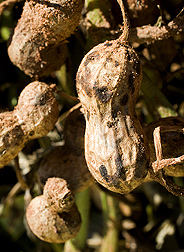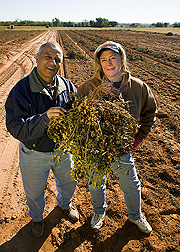Their Mission? To Build a Better Peanut
|
|
ARS scientists in Stillwater, Oklahoma, have a key role in an important new mission: Improve the peanut.
Actually, scientists there in ARS’s Wheat, Peanut, and Other Field Crops Research Unit have been developing better peanuts for decades. But now they’re joining the Oklahoma Peanut Commission and state research and extension professionals in a wide-ranging initiative to produce disease-resistant plants whose peanuts consumers find tasty, fresh, and healthful.
“We’re excited about this new program,” says unit research leader Dave Porter. “It fortifies and expands our work to enhance, through breeding, the genetic diversity of peanut plants and to come up with superior peanut products.”
The program addresses recent declines in peanut production in Southern Plains states. Though Virginia, the Carolinas, Georgia, and Alabama are the nation’s major peanut-production areas, Oklahoma, Texas, and New Mexico have significant peanut industries as well.
Porter says the new initiative can help meet an increasing demand for peanuts through economical, sustainable, and environmentally compatible management strategies. “It can also lead to improved crop production that allows for less pesticide use and greater product value, quality, and safety,” he adds.
|
|
A vital aspect of the new push is to continue work on combining traits of peanut plants that resist plant diseases with those that can boost the peanut’s oleic acid content. Studies have shown that oleic acid may promote lower serum cholesterol levels and lower the risk of coronary heart disease. It also staves off deterioration, giving peanut products longer shelf lives.
Peanut research at Stillwater is led by plant pathologist Hassan Melouk and biologist Kelly Chenault, who approach the new initiative with a full head of steam generated by recent accomplishments.
The main focus of their work has been diseases caused by fungi and viruses. “These maladies drive up peanut-production costs through factors such as pesticide application,” says Chenault. “They also spur yield losses of up to 50 percent.”
Of particular interest to them is Sclerotinia blight, which is caused by the fungal pathogen S. minor. Other work centers on southern blight and early leaf spot.
Collaborating with researchers at Oklahoma State (OSU) and Texas A&M universities, Melouk previously developed and released several cultivars: Three resist Sclerotinia blight, and two others were the first to possess both blight resistance and better quality oil with high oleic acid content. (See “Working for [Better] Peanuts: New Cultivars Resist Disease and Spoilage,” Agricultural Research, August 2003, p.11.)
Now Melouk is working with peanut lines from Bolivia and Ecuador that resist the blight and may be a boon to breeding in the United States. “We’ve identified several types that, in greenhouse and field testing, have shown excellent resistance to Sclerotinia blight,” he says.
Meanwhile, On the Genetic Front
Chenault’s breakthroughs have come on the genetic front, with disease-resistant peanut plants. Her goal is to someday integrate the resistance genes into susceptible peanut varieties.
Recently, she and geneticist Andrea Maas identified a molecular marker in peanuts that’s associated with resistance to Sclerotinia blight. Maas, who was with OSU during this study, now works in ARS’s Coastal Plain Experiment Station in Tifton, Georgia.
“This marker appears only in Runner market types of peanut showing high resistance to S. minor infection,” says Chenault. “It wasn’t present in those Runner market types shown to be moderately resistant or susceptible.”
Runners—the market type preferred by peanut butter producers—are grown in Oklahoma, Texas, Georgia, Alabama, and Florida. Other market types grown in the United States are Spanish, Valencia, and Virginia.
Chenault and Maas looked for the molecular marker in 43 different genotypes, representing all four peanut types possessing known levels of resistance to the disease. “The marker was also found in S. minor-resistant Spanish and Valencia genotypes tested, but not in any Virginia genotypes, either susceptible or resistant,” says Chenault.
Chenault’s team was assisted by Melouk; agronomist Roy Pittman of ARS’s Plant Genetic Resources Conservation Unit in Griffin, Georgia; and North Carolina State University researchers Tom Islieb and Shyam Tallury.
Potentially Useful Genes
Chenault and Melouk have also studied genes from rice and alfalfa that help those plants resist Sclerotinia blight. They evaluated 32 peanut lines containing these genes—a rice chitinase and an alfalfa glucanase—which degrade the cell walls of many fungi that attack plants.
They studied resistance to Sclerotinia blight in small field plots for several years and found the most susceptible peanut variety to be Okrun. This variety, with high potential grade and yield and released by ARS and OSU in 1989, scored a 58-percent infection rate.
“All other lines averaged at least 15 percent less disease than Okrun, and some had up to 35 percent less,” says Chenault. “This shows that these lines may one day be useful in traditional breeding programs aimed at disease resistance.”
Chenault and OSU Department of Statistics researcher M.E. Payton, who assisted with the rice and alfalfa studies, have also studied tomato spotted wilt virus. This disease afflicts peanut plants as well. “We’re seeking to exploit a gene—the nucleocapsid, or N, gene—that can regulate virulence in a classic cross-protection manner,” says Chenault. “So far, we’ve transplanted this gene into an Okrun peanut variety but have not yet tested the plants for virus resistance.”
“Southwest U.S. peanut producers desperately need new, high-quality, disease-resistant peanut cultivars,” says Porter. “The exciting new initiative at Stillwater is focused on delivering these needed products to the producer as quickly as possible. Reinvigorating peanut production in the Southwest is vital to ensuring a safe, stable supply of American peanuts to consumers worldwide.”—By Luis Pons, Agricultural Research Service Information Staff.
This research is part of Plant Diseases (#303) and Plant, Microbial, and Insect Genetic Resources, Genomics, and Genetic Improvement (#301), two ARS National Programs described on the World Wide Web at www.nps.ars.usda.gov.
Kelly D. Chenault and Hassan A. Melouk are in the USDA-ARS Wheat, Peanut, and Other Field Crops Research Unit, 1301 North Western Road, Stillwater, OK 74075-2714; phone (405) 624-4141, fax (405) 624-4142.
"Their Mission? To Build a Better Peanut" was published in the April 2006 issue of Agricultural Research magazine.








